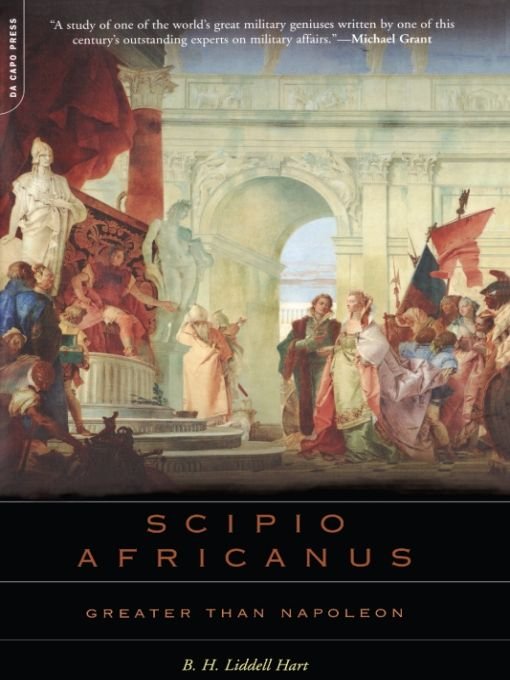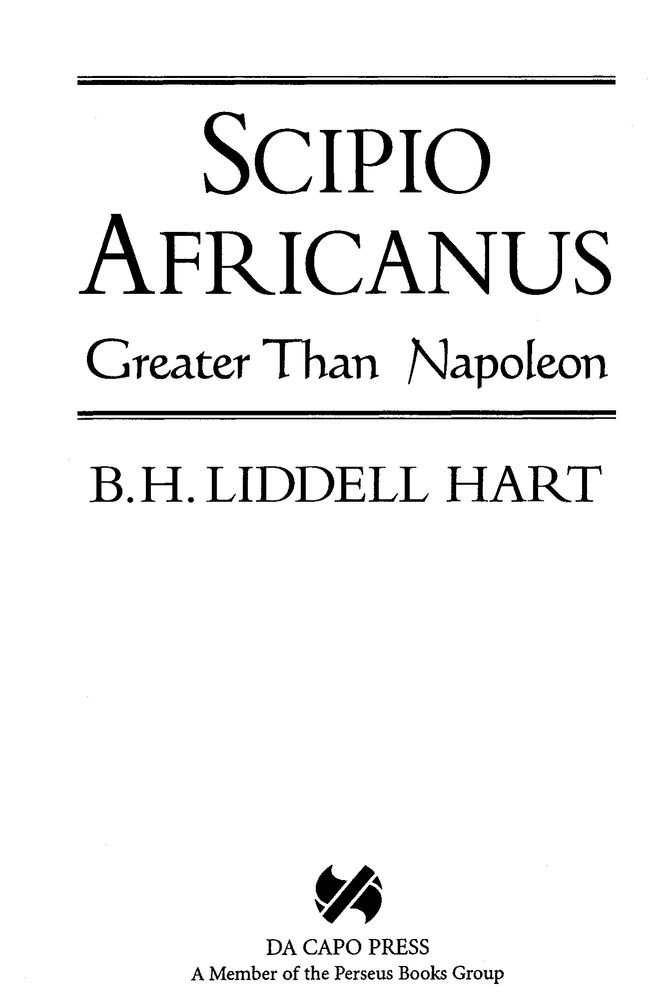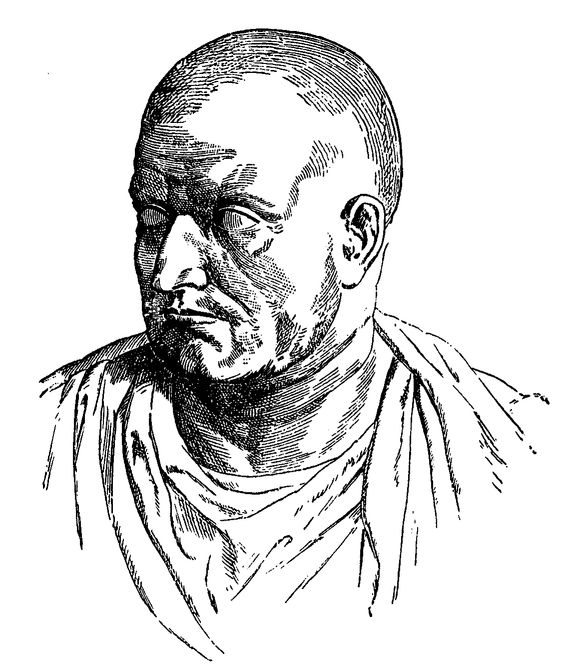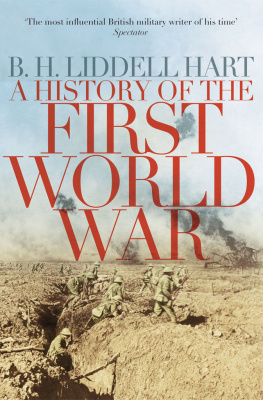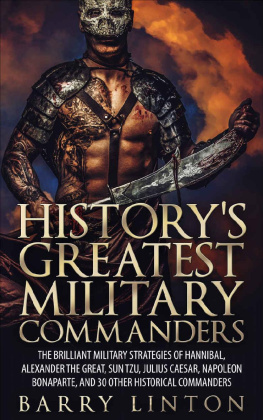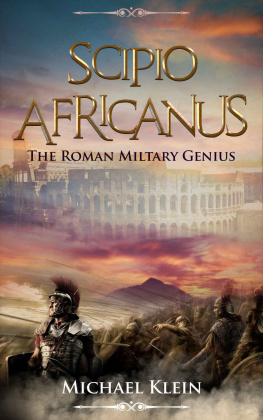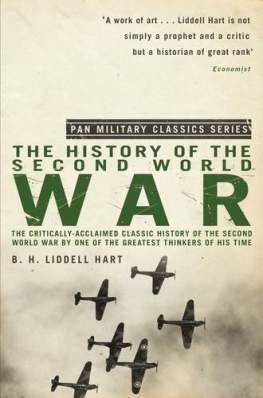Table of Contents
PUBLIUS CORNELIUS SCIPIO AFRICANUS
TO
THE MASTER, FELLOW AND SCHOLARS
OF
CORPUS CHRISTI COLLEGE
CAMBRIDGE
PREFACE.
THE excuse for this book is that no recent biography of Scipio exists; the first and last in English appeared in 1817, and is the work of a country clergyman, who omits any study of Scipio as a soldier ! The reason for this book is that, apart from the romance of Scipios personality and his political importance as the founder of Romes world-dominion, his military work has a greater value to modern students of war than that of any other great captain of the past. A bold claim, and yet its truth will, I hope, be substantiated in the following pages.
For the study of tactical methods the campaigns of Napoleon or of 1870, even of 1914-1918 perhaps, are as dead as those of the third century B.C. But the art of generalship does not age, and it is because Scipios battles are richer in stratagems and rusesmany still feasible to-daythan those of any other commander in history that they are an unfailing object-lesson to soldiers.
Strategically Scipio is still more modern. The present is a time of disillusionment, when we are realising that slaughter is not synonymous with victory, that the destruction of the enemys main armed forces on the battlefield is at best but a means to the end, and not an end in itself, as the purblind apostles of Clausewitz had deceived themselvesand the world, unhappily. In the future, even more than in the past, the need is to study and understand the interplay of the military, economic, and political forces, which are inseparable in strategy. Because Scipio more than any other great captain understood and combined these forces in his strategy, despite the very modern handicap of being the servant of a republicnot, like Alexander, Frederick, Napoleon, a despot,the study of his life is peculiarly apposite to-day. Above all, because the moral objective was the aim of all his plans, whether political, strategical, or tactical.
My grateful thanks are due to Sir Geoffrey Butler, K.B.E., M.P., Fellow of Corpus Christi College, Cambridge; to Mr W. E. Heitland, M.A., Fellow of St Johns College, Cambridge ; and to Mr E. G. Hawke, M.A., Lecturer at Queens College, London, for their kindness in reading the proofs and for helpful comments.
B. H. L. H.
INTRODUCTION
THE road to failure is the road to famesuch apparently must be the verdict on posteritys estimate of the worlds greatest figures. The flash of the meteor impresses the human imagination more than the remoter splendour of the star, fixed immutably in the high heavens. Is it that final swoop earthwards, the unearthly radiance ending in the common dust, that, by its evidence of the tangible or the finite, gives to the meteor a more human appeal? So with the luminaries of the human system, provided that the ultimate fall has a dramatic note, the memory of spectacular failure eclipses that of enduring success. Again, it may be that the completeness of his course lends individual emphasis to the great failure, throwing his work into clearer relief, whereas the man whose efforts are crowned with permanent success builds a stepping-stone by which others may advance still farther, and so merges his own fame in that of his successors.
The theory at least finds ample confirmation in the realm of action. A Napoleon and a Lee are enshrined in drama, in novel, and in memoir by the hundred. A Wellington and a Grant are almost forgotten by the writers of the nations they brought through peril intact and victorious. Even a Lincoln may only have been saved from comparative oblivion by the bullet of an assassin, a Nelson by death in the hour of victory, which relieved by emotion-awakening tragedy the disrepute of a successful end. It would seem likely that a century hence the name of Ludendorff will be emblazoned as the heroic figure of the European War, while that of Foch sinks into obscurity; there are signs already of this tendency to exalt the defeated.
For permanence of reputation a man of action must appeal to emotion, not merely to the mind ; and since the living man himself no longer can kindle the emotions of posterity, the dramatic human touch of ultimate failure is essential. This truth would seem to hold in most branches of human effort. Scotts gallant but unavailing attempt to reach the South Pole lives in the worlds memory, while the successful ventures of Amundsen and Peary are fading. In sport, Dorandos Marathon is an enduring memory; but who among the general public could recall the name of Hayes, the actual victor, or, indeed, that of any subsequent Marathon winner.
For this irrational, this sentimental verdict, it is fashionable to fix the blame on modern journalism, yet the barest survey of history shows that its origins lie far back in the mists of time. On the historian, in factwho of all men should by training and outlook put his trust in reasonfalls the major responsibility for this eternal tendencythe glorification of dramatic failure at the expense of enduring achievement. The history of the ancient confirms that of the modern world, and in no example more strikingly than that of Scipio Africanus, the subject of this brief study, which is an attempt to redress the historical balance by throwing further weights of knowledge and military appreciation on Scipios side, not as commonly by detraction from his rivals. Gradually, progressively, the belittlement of Scipio has been pressed by historians anxious to enhance the fame of Hannibal. It is the more unreasonable, the less excusable, because here there are no mass of conflicting sources and contemporary opinions. The reliable data on which to base a study and a judgment are practically limited to the works of Polybius and Livy, with but a few grains from other, and admittedly less trustworthy, ancient authorities. And of these two, Polybius, the earlier, is almost contemporary with events, the friend of Gaius Llius, Scipios constant subordinate, from whom he could get first-hand evidence and judgments. He had the family archives of the Scipios at his disposal for research, and he had been over the actual battlefields while many of the combatants were still alive. Thus he gained an almost unique base upon which to form his estimate.
Further, being a Greek, his views are less suspect than those of Livy of being coloured by Roman patriotic bias, while modern historical criticism is unanimous in its tribute alike to his impartiality, his thoroughness of research, and the soundness of his critical insight.
The verdict of Polybius is clear, and his facts still more so.
That there were divergent judgments of Scipio among the Romans of succeeding generations is true; but Polybius explains the reasons so convincingly, their truth borne out by the known facts of Scipios strategical and tactical plans, that there is no vestige of excuse for modern writers to regard as due to luck what superstition led the ancients to ascribe to divine aid. The fact that he was almost the most famous man of all time makes every one desirous to know what sort of man he was, and what were the natural gifts and the training which enabled him to accomplish so many great actions. But none can help falling into error and acquiring a mistaken impression of him, as the estimate of those who have given us their views about him is very wide of the truth.... They represent him as a man favoured by fortune ... such men being, in their opinion, more divine and more worthy of admiration than those who always act by calculation. They are not aware that the one deserves praise and the other only congratulation, being common to ordinary men, whereas what is praiseworthy belongs only to men of sound judgment and mental ability, whom we should consider to be the most divine and most beloved by the gods. To me it seems that the character and principles of Scipio much resembled those of Lycurgus, the Lacedmonian legislator. For neither must we suppose that Lycurgus drew up the constitution of Sparta under the influence of superstition and solely prompted by the Pythia, nor that Scipio won such an empire for his country by following the suggestion of dreams and omens. But since both of them saw that most men neither readily accept anything unfamiliar to them, nor venture on great risks without the hope of divine help, Lycurgus made his own scheme more acceptable and more easily believed in by invoking the oracles of the Pythia in support of projects due to himself, while Scipio similarly made the men under his command more sanguine and more ready to face perilous enterprises by instilling into them the belief that his projects were divinely inspired. But that he invariably acted on calculation and foresight, and that the successful issue of his plans was always in accord with rational expectation, will be evident.

